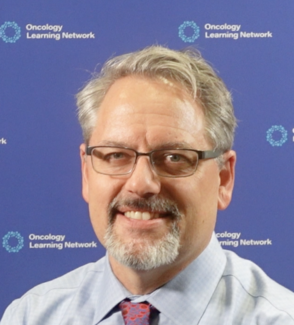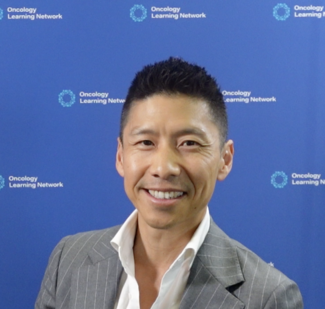Epcoritamab Plus R-ICE Shows Deep Responses and Manageable Safety for Patients With DLBCL Eligible for ASCT: EPCORE NHL-2 Trial
Raul Cordoba, MD, Hospital Universitario Fundación Jiménez Díaz, Madrid, Spain, discusses the results from a phase 1b trial evaluating the safety and efficacy of epcoritamab, a novel CD3-CD20 T-cell engaging bispecific antibody, in combination with rituximab, ifosfamide, carboplatin, etoposide (R-ICE), for the treatment of relapsed/refractory (R/R) diffuse large B-cell lymphoma (DLBCL).
These data were presented at the European Hematology Association (EHA) 2025 Congress in Milan, Italy. The results of this analysis demonstrated efficacy and safety for epcoritamab in combination with R-ICE for patients who have R/R DLBCL.
Dr Cordoba stated, “These results of epcoritamab in combination with R-ICE in this setting of relapsed/refractory diffuse large B-cell lymphoma patients continue to show that when adding epcoritamab to immune chemotherapy, the proportion of patients who respond to treatment and proceed to autologous system cell transplantation (ASCT) could be increased and therefore patients can be treated with ASCT, which at the end is a corrective approach.”
Transcript:
Hello everybody, my name is Raul Cordoba. I am the Associate Chief of Hematology at Fundación Jiménez Díaz at University Hospital in Madrid, Spain, and the head of the Lymphoma Unit in this institution.
I have been the principal investigator in my center of the EPCORE NHL-2 trial. Today I am going to share with you the first disclosure of epcoritamab in combination with R-ICE in patients with relapsed/refractory diffuse large B-cell lymphoma eligible for autologous stem cell transplantation. This data come from cohort 10 of the EPCORE NHL-2 trial.
You all know that 50% of patients with relapsed/refractory diffuse large B-cell lymphoma are usually refractory to salvage immune chemotherapy, limiting therefore transplant eligibility, and leading to poor outcomes. One standard of care regimen is the R-ICE salvage therapy, resulted in an overall response rate of 64% and a complete response of 36% as previously reported. Therefore, there is a critical need for more effective regimens that increase CR rates and improve transplant eligibility, and enable more patients to proceed to autologous stem cell transplantation.
For this, we have a new drug, which is epcoritamab, it's a subcutaneous CD3-CD20 T-cell engaging bispecific antibody that induces potent T-cell mediating killing of malignant CD20 B-cells. Previously reported at previous international conferences, epcoritamab in combination has already shown a high complete response rate of 69% and high autologous stem cell transplantation rate of 55% in this setting of patients with relapsed/refractory diffuse blood B-cell lymphoma.
The objective of my presentation is to disclose these first data of epcoritamab in combination with R-ICE in patients with relapsed/refractory diffuse large B-cell lymphoma eligible for autologous stem cell transplantation. This is a clinical trial that in cohort 10 we enrolled patients to be treated with epcoritamab plus R-ICE. Epcoritamab was going to be given at the standard dose of 48 mg subcutaneously on a weekly basis from cycle 1 to cycle 4, and epcoritamab was going to be given up to 3 cycles.
Epcoritamab was going to be able to be delivered to patients until the autologous stem cell transplantation. If it was delayed because of any reason, patients could still be treated with epcoritamab every 2 weeks from 5 five to cycle 9.The primary end points of this study were overall response rate per Lugano criteria.
If we pay attention to the patient characteristics enrolled in this cohort, we enrolled 31 patients with a median age at enrollment of 62 years; 55% of patients were male with good performance status. And of notice is that many patients had a high tumor burden defined by advanced stage, patients with stage 3 and 4 were 61% of the patients enrolled and patients with bulky disease were 42% of the patients.
With regards to previous treatment history, 81% of patients received this regimen of epcoritamab plus R-ICE as a second-line therapy, but of notice that almost half of the patients, 48% of patients, were primary refractory and 65% of patients progressed within the first 12 months of a prior line of therapy. At the end, these patients were considered early relapses.
When it comes to efficacy, we could see that 65% of patients were able to complete treatment and proceed to autologous stem cell transplantation. Only 3 patients remained on epcoritamab and 8 patients discontinued treatment, 6 because of progressive disease and 2 patients because of other reasons. What is very relevant is that the median epcoritamab treatment initiated was 4 and the median R-ICE treatment cycles initiated were 3. And the relative dose intensity remained very high throughout the 3 treatment cycles. The median relative dose of both epcoritamab or R-ICE was about 80%. High response rates were seen overall and across subgroups.
In the entire cohort, the overall response rate was 87% of patients, achieving a complete response in 65% of patients. When we pay attention to the different group of patients with regards of prior lines of therapy, those patients that received epcoritamab R-ICE as a second-line therapy had almost the same data of 88% of patients with an overall response rate and 68% of patients achieving a complete response. For those patients receiving epcoritamab R-ICE in third line or beyond, the overall response rate was almost the same, 83%, but with a bit lower a complete response rate of 50%.
When we pay attention to patients that progress within the first 12 months of therapy, we see almost the same overall response rate around 85% with 55% of patients achieving a complete response. It can rise up to 91% overall response rate and 82% of patients achieving a complete response in those patients that relapsed after 1 year of first-line therapy.
We were able to see that many patients achieve a complete response, and these complete responses were long-lasting. 20 patients were able to complete treatment and receive autologous stem cell transplantation, and before transplant, 14 out of these 20 patients were in complete response. Of these 6 patients in partial response, 5 of them were able to deepen the response to complete response after the autologous stem cell transplantation. At 6 months, 81% of complete responses were ongoing, 74% of patients were progression-free, and all patients remained alive.
When it comes to safety, most of the adverse events that we saw in this trial were hematologic toxicities, probably related to R-ICE and not to epcoritamab. No toxic deaths were found in these studies. Despite the adverse events that we reported, 94% of patients had adverse events of grade 3 or above. Only 3 patients had to discontinue the trial drug because of an adverse event, but no patient had to discontinue because of an adverse event related to epcoritamab. What we saw was a treatment delay and epcoritamab was delayed in 71% of patients due to an adverse event.
One of the most common adverse events seen were infections that occur in 58% of patients, but only 16% of patients had serious infections. Febrile neutropenia was reported in 13% of patients, and all events resolved. ICANS was reported only in 1 patient and resolved within 2 days without any further treatment. We didn't find any clinical tumorlysis syndrome in this cohort of patients. Cytokine release syndrome (CRS) was of low grade and predictable. We saw only 52% of patients having a grade 1 or 2 CRS, so the same rate as when we use epcoritamab in third-line or use it in monotherapy. There were 31% of patients who needed to be treated with tocilizumab and all patients were resolved of these CRS and the median time to resolution had a median time of 2 days and no CRS led to epcoritamab discontinuation. As it happens with epcoritamab in monotherapy, CRS happened more commonly in cycle 1 day 15, around the first full dose of epcoritamab of 48 mg.
To conclude, epcoritamab plus R-ICE demonstrated high overall and complete response rates in second-line and beyond relapsed/refractory diffuse large B-cell lymphoma patients eligible for high doses of therapy and autologous stem cell transplantation. These rates were consistently high across subgroups, including patients with early relapse, that is patients relapsing within the first 12 months of first-line therapy. What is very relevant, is that most patients, 65% of them, were able to complete therapy and to proceed to autologous stem cell transplantation. With regards to safety, the adverse events were manageable with no discontinuations due to epcoritamab and CRS was of low grade, with predictable onset and all events resolved.
These results of epcoritamab in combination with R-ICE in this setting of relapsed/refractory diffuse large B-cell lymphoma patients continue to show that when adding epcoritamab to immune chemotherapy, the proportion of patients who respond to treatment and proceed to autologous system cell transplantation could be increased, and therefore patients can be treated with ASCT, which at the end is a corrective approach. Thank you very much for your attention.
Source:
Cordoba R, Trneny M, De Vos S, et al. First disclosure of epcoritamab + R-ICE in patients with relapsed/refractory diffuse large B-cell lymphoma (R/R DLBCL) eligible for autologous stem cell transplantation (ASCT): EPCORE NHL-2. Presented at EHA 2025 Congress. June 12-June 15, 2025; Milan, Italy. Abstract 4159322.















